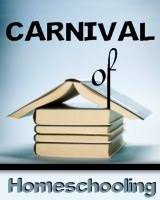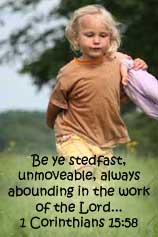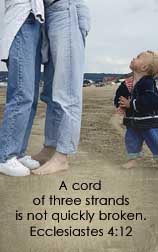Wednesday, March 9, 2011
Homeschooling the Precocious Preschooler
8:08 AM |
Edit Post
Question: My three-and-a-half year old daughter seems to be advanced for her age. She can already recognize most of her letters, and she’s begging me to give her “schoolwork” just like her older brother is doing.
I know a lot of homeschoolers say “better late than early”, and I don’t want to push her, but I don’t want to ignore her interests, either. Do you have any suggestions for beginning academic work for a young, but eager, preschooler?
Answer: I think many homeschooling parents struggle with when and how to start “doing school” with their younger children. We often hear conflicting advice from “the experts”. I’ve heard of programs designed to teach babies to “read”. On the other hand, there are folks who advocate waiting to begin any formal academics until children are 8, 9, or even 10 years old. We don’t know who to believe!
In my opinion, a lot of the confusion stems from cultural conditioning. Despite our separation from “the system”, we still, perhaps unwittingly, buy into some of its philosophy. The government school system tells us that Kindergarten begins in the September after which a child turns 5, and not a moment sooner. (If you’re child turns five on September 2nd, forget it!) However, the fact remains that readiness for school varies from child to child. I’ve met some 4-year-olds who are completely capable of doing “first grade” schoolwork, as well as 8 year olds who are still struggling with basic phonics skills.
All this to say that you know your child best. If your daughter is interested and excited to learn, don’t be afraid that you’ll somehow damage her by giving her schoolwork!
That being said, here are a few recommendations that I have for early academic work for the more “advanced” preschooler. These are ideas that have worked for us, but that doesn’t mean that they’ll work for everyone.
I would encourage you to remember to keep it simple. Most early learning can be accomplished by reading out loud, especially the Bible, and playing, especially outside. Helping out with household tasks such as sorting laundry or measuring ingredients for a recipe are also great opportunities for learning. Do your best not to fill your child’s life with academics to the point of neglecting these other areas.
Also, please don’t spend a lot of money on a fancy phonics program or math manipulatives. With a child who is truly “ready”, they’re probably an unnecessary expenditure. Of course, if you already own some things that you’ve used for your older children, go ahead and give them a try. Otherwise, here are a few ideas for teaching the “Three R’s” that have worked for us:
Reading– “Teach Your Child to Read in 100 Easy Lessons” is my top pick for simplicity, effectiveness, and cost. It is my hands-down favorite phonics curriculum, and it is perfect for the precocious preschooler. I purchased my copy of the book on homeschoolclassifieds.com for less than $10. You may even be able to borrow a copy from your local library before you decide to buy. The best part is how it is designed to be done while snuggling with your child on the couch. I even teach reading while nursing the baby.
Writing– I purchased a dry erase alphabet practice book for about $5 at Wal Mart. It has letters to copy and is filled with colorful pictures. My daughter never tires of it, even though she is almost 5 and has been using it for 2 years. Just be sure to cover your little one’s clothing with a paint shirt or smock, as dry erase marker will not wash out!
Arithmetic– Math manipulatives are not hard to find if you are creative. We’ve had many a counting lesson while snacking on grapes! Almost any collection of little toys can be used as math manipulatives. I happened to find a set of colorful counting bears at a discount store for $3. Then, using a Magnadoodle as a “slate” (a la Laura Ingalls Wilder), my daughter would count out bears and write numbers. After a while, I began to write simple equations (e.g. 2+2=4) and have her build them with bears. In this way, she could do her own math lessons while her older brother was completing his.
So, there you have it! Pretty simple, huh? I hope you some of these ideas will work for you…but please don’t beat yourself up if they don’t. Every child is different! Remember, you’ve taught your child how to walk and talk and many other important things already! Ideally, you want learning to continue to be a relaxed and enjoyable experience for both of you.
Blessings to You on Your Journey!
Tiana
Subscribe to:
Post Comments (Atom)
Subscribe via email
About Me

- Tiana
- I'm a Stay-at-Home, Christian, "crunchy" mama. I have been blessed with the calling to be a godly wife and mother. I am passionate about bringing up my children in the discipline and instruction of the LORD, through home education and discipleship. Helpmeet to my best friend and soulmate, Christopher since 1/29/2000, and mama to four little blessings, including a tiny, precious, newborn baby girl.
Most Popular Posts
- "Being Equipped" and the Will of God
- "Doing School"
- A Little Bit of Spontaneity
- Am I Really Content?
- Coming Out of the Closet
- Desperate for Discipleship
- Don't Be Afraid, Have Faith
- How Doing Something "Good" Can Keep You From Obeying
- Is it Really All About Me?
- Over-Protected, Under-Sheltered
- Remembering Acacia's Birth
- Slow Homeschooling
- The Most Important Thing
- What Do You Mean, "Unsocialized?"
- What Does "Enough" Look Like?
Fixing Your Heart on Titus 2
My Wired Style
Our Curriculum 2010-2011
Bible--Child's Story Bible by Catherine Vos, Apologia Biblical World View Book 1, "Who is God and Can I Really Know Him?"
Catechism-- "Training Hearts, Teaching Minds" by Starr Meade
Phonics--Teach Your Child to Read in 100 Easy Lessons
Literature--Ambleside Online Year 0 Recommended Books
(Kindergarten), Year 1 Booklist (1st Grade)
Handwriting--Bible Copywork, made using Educational Fontware
Spelling-- All About Spelling Level 1 (1st grade)
Math--Math-U-See Primer (Kindergarten) , Math-U-See Alpha (1st grade)
Science--Apologia Exploring Creation With Astronomy
World History--Simply Charlotte Mason's Genesis Through Deuteronomy and Ancient Egypt
American History--The Light and The Glory For Children Series
Art--Interest-led projects and handicrafts
Geography and Missions-- "Hero Tales" by Dave and Neta Jackson, as well as various other missionary biographies, incorporating globe and map study
*We will be studying music and phy-ed., participating in a writing club and nature club, as well as attending various field trips, with our church's homeschool group.*
























1 comments:
Hey Tiana! I agree with everything you said. However, this year I went and bought workbook stuff for our 3 year old. This is the FIRST TIME I have done so. What I did for "preschool" with the older three is not working for him. Why? He INSISTS it's not school and he wants to do school!!! He wants BOOKS that are HIS. So, I sucked it up and bought him some, LOL. We are using Language Lessons for Little Ones, and a beginning Mathematical Reasoning book. Together, they take about 15-20 minutes out of my day and he is happy because he has "schoolbooks." I just wanted to throw that out there for anyone whose children are like my son and are adamant that sorting legos and other such things "isn't school." I don't recommend spending much money on preschool, but alas, it is working for us this year and the peace it has brought to our school is more than worth it :).
Post a Comment